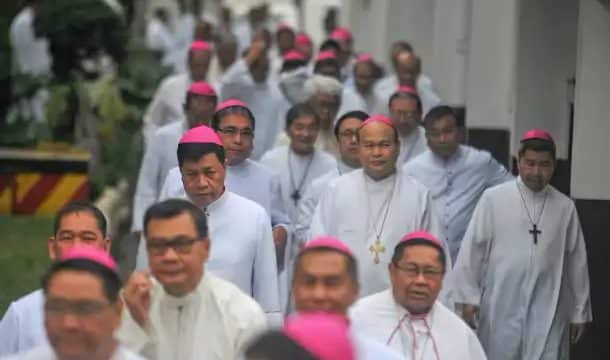
MANILA (UCAN): Father Bernardo Pantin, the secretary general of the Catholic Bishops’ Conference of the Philippines, confirmed that the Philippines bishops plan to assess the influence of the Church and its teachings on the recent polls that saw Ferdinand “Bongbong” Marcos Jr. son and namesake of the late dictator, Ferdinand Marcos, elected as president of the country. He won a landslide victory against former vice president, Leonor Robredo, in May.
The poll result will be part of the agenda when more than 90 bishops gather from July 9 to 11 for their plenary meeting, said “They [the bishops] will talk about and assess the 2022 presidential elections. They will discuss the results, of course, and how the bishops’ conference can cooperate with the new administration led by President Ferdinand Marcos, Jr.,” Father Pantin explained to Radyo Veritas.
Hundreds of clergymen, including bishops, eschewed public neutrality and publicly supported Robredo, which Catholic conservatives criticised as “meddling” or “partisan.”
Father Pantin said, “Our bishops will meet with the lay group to discuss or to talk about their experience in the recently held elections. Part of the discussion was the relevance of our clergymen in politics.”
They [the bishops] will talk about and assess the 2022 presidential elections. They will discuss the results, of course, and how the bishops’ conference can cooperate with the new administration led by President Ferdinand Marcos, Jr.
He said the times had changed since the 1986 People Power Revolution toppled Marcos Sr. from power.
The late Jaime Cardinal Sin, archbishop of Manila, had called on millions of Filipinos to march along Epifanio de los Santos Avenue [EDSA] following fraudulent snap elections and a civil disobedience campaign to protest against Marcos’ dictatorship.
“Before the Catholic Church was very influential. People listened to the bishops and priests. But now, despite, many groups of clergymen and even bishops, people still voted for the candidate, which clergymen did not endorse. This begs the question, are we still relevant today?” Father Pantin wondered.
Father Joem Afable from Sorsogon, likewise said that the bishops’ assessment should arrive at “solid and well-formed” conclusions on the influence of the Catholic Church in the everyday life of the Filipino people.
“Perhaps we’re becoming like Europe. We tend to separate our religious life from our civil life. We just wanted the Catholic Church to stay within its walls with priests celebrating the Mass and the sacraments,” Father Afable remarked.
As we celebrate the 500 years of Christianity in the Philippines. The Chaplaincy to Filipino Migrants organises an on-line talk every Tuesday at 9.00pm. You can join us at:
https://www.Facebook.com/CFM-Gifted-to-give-101039001847033
Perhaps we’re becoming like Europe. We tend to separate our religious life from our civil life. We just wanted the Catholic Church to stay within its walls with priests celebrating the Mass and the sacraments
Father Afable
“We don’t want them to engage in politics anymore,” he said.
Father Afable also said the outcome of the assessment should be an eye-opener to both clergy and the lay people about the reality of the Catholic Church in the Philippines.
“We need to be objective in our assessment. Despite many groups of clergymen endorsing the former vice president, why was she left behind with more than 15 million votes? Are we ready to confront the answer to this question?” the priest added.
Churchgoers likewise expected the bishops to come up with a collective statement to guide parishioners in the next elections.
“We hope they can come up with an objective assessment and let the public read the document. We also need to be informed of their assessment,” a Manila parishioner, James Cruz, remarked.








